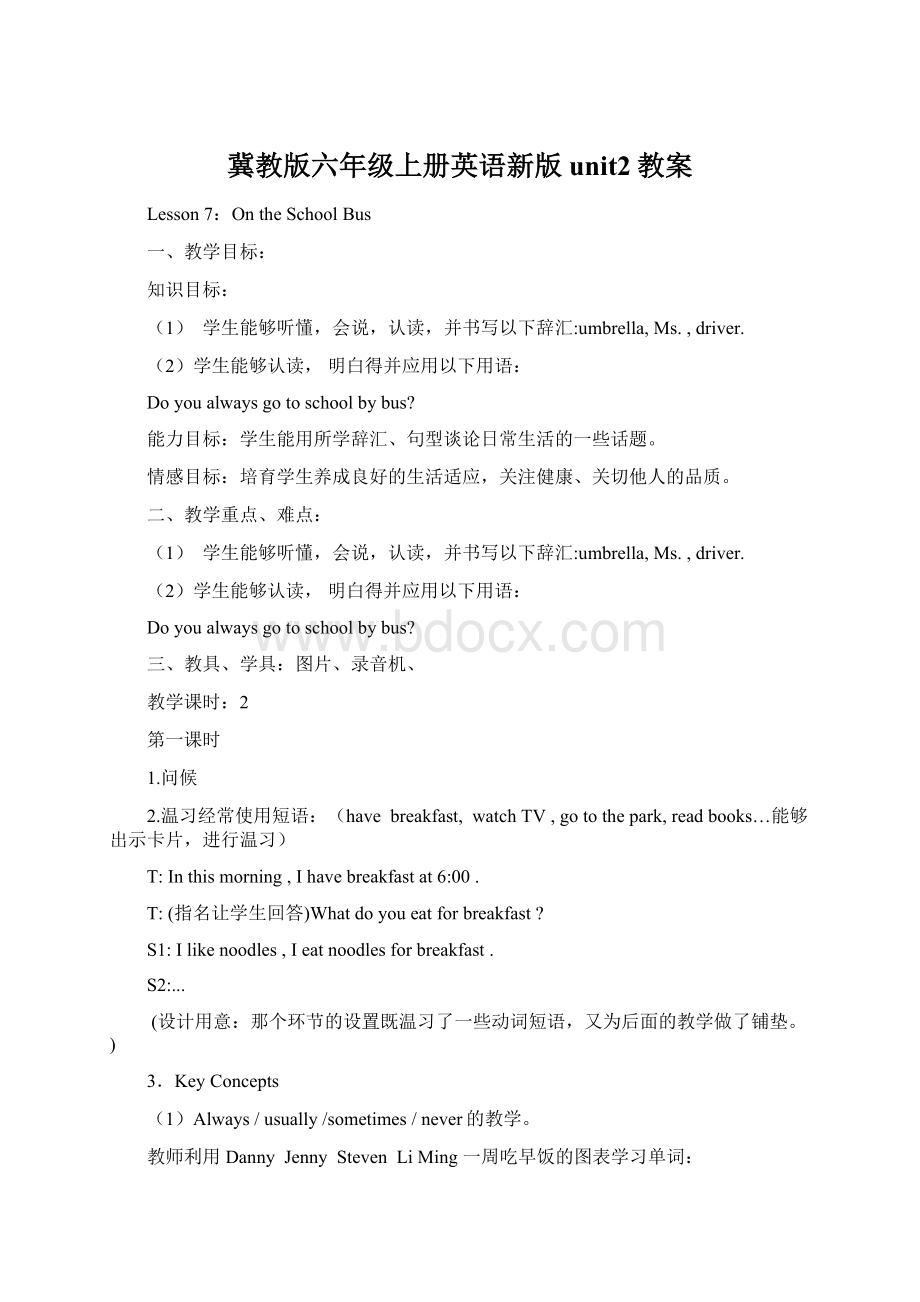冀教版六年级上册英语新版unit2教案.docx
《冀教版六年级上册英语新版unit2教案.docx》由会员分享,可在线阅读,更多相关《冀教版六年级上册英语新版unit2教案.docx(14页珍藏版)》请在冰豆网上搜索。

冀教版六年级上册英语新版unit2教案
Lesson7:
OntheSchoolBus
一、教学目标:
知识目标:
(1) 学生能够听懂,会说,认读,并书写以下辞汇:
umbrella,Ms.,driver.
(2)学生能够认读,明白得并应用以下用语:
Doyoualwaysgotoschoolbybus?
能力目标:
学生能用所学辞汇、句型谈论日常生活的一些话题。
情感目标:
培育学生养成良好的生活适应,关注健康、关切他人的品质。
二、教学重点、难点:
(1) 学生能够听懂,会说,认读,并书写以下辞汇:
umbrella,Ms.,driver.
(2)学生能够认读,明白得并应用以下用语:
Doyoualwaysgotoschoolbybus?
三、教具、学具:
图片、录音机、
教学课时:
2
第一课时
1.问候
2.温习经常使用短语:
(havebreakfast, watchTV ,gotothepark, readbooks…能够出示卡片,进行温习)
T:
Inthismorning,Ihavebreakfastat6:
00.
T:
(指名让学生回答)Whatdoyoueatforbreakfast?
S1:
Ilikenoodles,Ieatnoodlesforbreakfast.
S2:
...
(设计用意:
那个环节的设置既温习了一些动词短语,又为后面的教学做了铺垫。
)
3.KeyConcepts
(1)Always/usually/sometimes/never的教学。
教师利用Danny Jenny Steven LiMing一周吃早饭的图表学习单词:
Sunday
Monday
Tuesday
Wednesday
Thursday
Friday
Saturday
Danny
donut
donut
donut
donut
donut
donut
donut
Jenny
sandwich
sandwich
sandwich
sandwich
sandwich
Steven
soup
soup
LiMing
T:
FromSundaytoSaturday,Dannyeatsadonuteveryday.Healwayseats
donutsforbreakfast.(教师放慢速度,并板书这句话)
板书:
Healwayseats breakfast.
T:
A-L-W-A-Y-S always.Followme,please.
T:
(教师在图画下面板书单词)
always usually sometimes never
T:
WhatdoesJennyeatforbreakfast?
S:
Sheeatsasandwichforbreakfast.
T:
Yes,Sheusuallyeatsasandwichforbreakfast.Sheusuallyeatsbreakfast.
T:
(率领学生认读单词并板书)usually
T:
DoesStevenalwayseatbreakfast?
S:
No.
T:
Yes,Hesometimeseatsbreakfast.
T:
DoesLiMingeatbreakfasteveryday?
S:
No.
T:
Yes,Henevereatsbreakfast.Butwewillalwayseatbreakfast,That’sgoodforyou.(板书单词,同时渗透德育教育)
(2)单词的明白得和运用。
(由于这四个表示频度的副词对学生来讲比较抽象,因此教师能够利用上面的图示帮忙学生认读并熟记单词,有必要让学生说说这四个单词的区别,从而让他们明白得并能灵活运用。
)
(设计用意:
通过那个环节的设置能够形象、直观地让学生明白这四个单词的意思)
(3)作业:
用单词Always/usually/sometimes/never造句
第二课时
1.问候
2.温习经常使用单词:
always usually sometimes never
(设计用意:
那个环节的设置既温习了一些动词短语,又为后面的练习做了铺垫。
)
3课文内容。
1)播放课文录音,听录音跟读画出你不知道单词和句子。
2)回答下列问题
T:
Afterbreakfast,JennyandLiMing gotoschool,Howdotheygotoschool?
S:
Walktoschool
Ridethebicycle
Bybus…(给学生一个猜猜的环节)
T:
Yes,theywalktothebusstop,Theygotoschoolbybus,Look,Herecomestheschoolbus,andthisisbusdriver,MsScott.
T:
Butit’srainy,theyneedbootsandumbrellas.
Look,ThisisJennywithherbootsandumbrellaonarainy,
S:
No.
T:
Yes,Sheiswet.ThisisJennywithoutherbootsandumbrella.
4、齐读课文
五、学唱歌曲
六、做一做
指导学生完成课后题及配套练习。
Lesson8 LiMingMeetsJenny’sClass
一、教学目标:
一、知识技术:
(1) 学生能够听懂,会说,认读,并书写以下辞汇:
well,class.
(2)学生能够认读,明白得并应用以下用语:
Whereareyoufrom?
Whatsubjectsdoyouhaveintheschool?
Howmanyclassesdoyouhaveeachdays?
二、进程与方式:
通过情景创设,让学生明白得句意,并在情景中进一步学习,培育自主学习的能力,取得与同窗交流的方式。
3、情感态度:
培育学生与他人进行交流的良好适应。
二、教学重难点:
(1) 学生能够听懂,会说,认读,并书写以下辞汇:
well,class.
(2)学生能够认读,明白得并应用以下用语:
Whereareyoufrom?
Whatsubjectsdoyouhaveintheschool?
Howmanyclassesdoyouhaveeachdays?
四、教具、学具:
录音机、
五、教学进程:
1.Greetings:
Hello!
Howareyoutoday?
Nicetomeetyou!
Howistheweather?
2.Song:
SinganEnglishsong
(用师生的自由交流和歌曲给学生创设一种宽松、愉悦的学习气氛,使后面的教学加倍流畅自如。
)
1.手偶演出对话:
A:
Hello,Nicetomeetyou!
B:
NicetoMeetyou,too.
A:
Whereareyoufrom?
B:
I’mfromCanada.
A:
Whatsubjectsdoyouhaveintheschool?
B:
Chinese,math,English,science,art….
A:
Howmanyclassesdoyouhaveeachdays?
B:
fourclassesinthemorningandthreeintheafternoon.
3.学习课文,教师能够先介绍。
T:
Inthislesson,LiMingwantstogotoschoolinCanada.HewantstolearnEnglish.NowLiMingmeetsJenny’sclass.Canyouguesswhatdotheytalkabout?
(practicethequestionsagain.)
(播放录音,让学生回答下列问题)
Whereareyoufrom?
Whatsubjectsdoyouhaveintheschool?
Howmanyclassesdoyouhaveeachdays?
引导学习抓住文中的重点句型提问并会回答。
培育学生对重点知识的提炼,帮忙、指导学生学习,培育自学能力。
)
7.Studentbook:
Playtheaudiotapeasthestudentsfollowintheirbooks.
Lesson9:
Mr.WoodTeachesaLesson
一、教学目标:
一、 知识技术:
(1)学生能够听、说、读、写单词:
ill,lesson,its.
(2)学生能认读,明白得并应用以下句型:
how’stheweathertoday?
What’sthetemperature?
Itis_______ degree(s)。
二、进程与方式:
通过实际温度和图形的学习,学生能较容易的明白得明白把握单词和句子。
3、情感态度:
通过天气、温度的学习,激发学生酷爱生活。
二、教学重难点:
(1)学生能够听、说、读、写单词:
ill,lesson,its.
(2)学生能认读,明白得并应用以下句型:
how’stheweathertoday?
What’sthetemperature?
Itis_______ degree(s)。
四、教具预备:
实物温度计、不同温度的水,录音机和磁带。
五、教学课时
第一课时
Step1:
ClassOpeningandReview
a.Greeting:
Goodmorning,everyone!
…….
b.Reviewwords:
rainy,sunny,windy,cloudy,snowy,
Singtheweathersong.(在这部份教师能够在黑板上画出这几个天气,然后让学生来讲,这几幅图都是什么天气,如此不仅检查了学生对以前知识的把握,同时有的差生也是一种巩固和提高。
)
Step2:
Newconcepts
T:
Now,class.Doyouwanttogoonatripwithme?
S:
.
T:
Iwanttogoonatripeagerly.ButIdonotknowtheweatherandthetemperaturethere.Canyouhelpme?
Look.(教师出示课件,课件上是一副中国城市地图,别离标着每一个城市的天气情形。
由此引出本课的重点知识What`sthetemperature?
Itis degree(s).如此引出比较自然,前后联系紧密。
)
c.Demonstrate:
“temperature”witharealthermometer.
T:
HowistheweatherinShanghai?
S:
Itis________ degree(s). .
T:
What`sthetemperatureinShanghai?
S:
Itis 29 degrees.
(板书What`sthetemperature?
Itis degree(s).安排适当的练习,通过练习学生初步把握。
)
Putthethermometerinacupofcoldwaterandthenacupofhotwater.
eg.T:
Thewateriscold.
What`sthetemperature?
S:
Itis ________ degree(s). .
T:
Itis________ degree(s). Sayit,please.
T:
Thewaterishot.
What`sthetemperature?
S:
Itis ________ degree(s).
(学生分小组进行练习那个对话。
教师能够分给每一个小组一个温度计,学生能够随意的去测量他们想测量的东西,如此不仅表现出了学生的自主性,同时提高了他们的动手能力,增加了学生的爱好,更好的把握这部份的知识。
)
Step3:
homework
第二课时
Step1:
ClassOpeningandReview
a.Greeting:
Goodmorning,everyone!
…….
b.LeadtheSstopracticethisdialogue:
S1:
Howistheweather,today?
S2:
Itis .
S1:
What`sthetemperature?
S2:
Itis________ degree(s).
Step2:
temperature.
播放课文录音,第一遍学生听。
第二编学生跟读。
四人小组,小组内连番读课文,分角色读课文。
Step3:
classwork
出示图片,完成图表。
Weatherandtemperature
Chinese
English
temperature
wet
15degrees
dry
25degrees
hot
35degrees
sunny
cold
rainy
cool
Howistheweather,today?
S2:
Itis________.
S1:
What`sthetemperature?
S2:
Itis________ degree(s).
Step4.Let’sdoit:
1.Readpat1andanswerthequestions.
2.Lookandread.
3.Activitybook.
Lesson11:
HowManyAreThere?
一、 教学目标:
(1) 知识技术:
学生能够听、说、读、写单词:
word
学生能认读,明白得并应用以下句型:
howmanyarethere?
(2) 进程与方式:
利用游戏温习和引入规那么名词的复数,幸免语法学习的枯燥。
(3)情感态度:
通过游戏的引入,激发学生的英语学习爱好。
二、教学重点:
学生能够把握不规那么名词的复数形式。
三、教学难点:
学生能够把握和在句中灵活运用名词的复数。
四、教学课时2
第一课时
Step1.Greeting:
Hello,class!
Howareyoutoday?
Howistheweather?
……
Step2.Newconcepts
A. 出示实物:
T:
Hi,class.Whatisthis?
S:
Itisapencil.
T;Now,whatarethese?
S:
Theyarepencils.
b.Playagame:
“WHANT`SWRONG”to
reviewnounsthatformregularplurals.Herearesomenounsthatformregularpluralsthatthestudentsalreadyknow:
book,chair,girl,boy,desk,school,teacher,eraser,pencil,pen,marker,arm,ear,eye,leg,hand,finger,toe,apple,banana,orange,stamp……
(教师能够提早做一些单词卡片,把他们贴在黑板上,让学生找出这些单词变复数时的错误。
)
出示图片T:
Hi,class.Whatisthis?
S:
itisadish.
T;Now,whatarethese?
S:
Theyaredishes.
(从而引出规那么单词变复数的形式,用一样的方式,温习三角形引出dresses.)
Write“bus,box,watch”ontheblackboard.
b.TellSsthewordendinx,s,sh,ch,theyneedtoadd“es”,andpronounce/iz/.So:
dish---dishes bus---buses
box---boxes watch---watches
T:
Therewordsgetbiggerwithanesattheend.
Step3.Homework
Writetwentywordswithsandes
第二课时
Step1.Greeting:
Hello,class!
Howareyoutoday?
Howistheweather?
B.Showtheirwordswithsores
Step2.Newconcepts
a..设置情景
(早晨幼儿园学生上学的情景,有送小朋友的家长们)
T:
Class.(有多少人进校门)Onlyoneman,onewomanandonechild?
S:
No.
T:
Somanymen,women,andchildrendonatetheirthingsforthearea.
(引出men,children,women.)
man---men woman---women
child---children
T:
Herearesomewordsyouknow.Dotheygetbiggerwithansoranes?
Tomatopotatophoto
d.PlaytheaudiotapeandtheSsreadthesewordsafterthetape.
e.Play“TIC-TAC-TOE”topracticeregularandirregularplurals.
f.Dotheexercise
Foot-----tooth-----wife-----mouse-----
Deer----fish------sheep-----person----people
g.Listening:
ActivityBook No.2 andNo3.
Lesson11:
AlwaysDoYourHomework!
一、教学目标:
一、知识技术:
学生能够听、说、读、写单词:
alwayssometimes
学生能认读,明白得并应用以下句型:
Doyouhelpyourmother?
Doyouwalktoschool?
二、进程与方式:
借助表格训练学生的读和写,通过回答下列问题训练学生的听和说。
3、情感态度:
鼓舞学生踊跃参与教学活动,充分发挥学生的主体性。
二、教学重点:
温习形状和频度副词。
三、教学难点:
学生能够把握形状和频度副词并顺利完成表格。
四、教具学具:
表格,各类图形卡片,录音机和磁带
五、教学课时2
第一课时
Step1.Organizingtheteaching
1.Greetings
2.SinganEnglishsong“InTheBathroom”
(设计用意:
用歌曲把学生带入课堂,曾添活跃气氛,)
Step2.Revision:
Play“TrueorFalse”toreviewadverbsoffrequency.
教师出示句子:
a.Ineverbrush my teeth.
b.Ialwaysgotoschool.
c.Isometimesplay computer.
d.Iusually gotoschoolbytrain.
Step3.Keyconcepts:
1.Drawfourshapesontheblackboard.Besideeachshape,writeanadverboffrequencyandsaythesentence:
Let’sputan“A”foralways. Let’sputan“O”foroften.
Let’sputan“S”forsometimes. Let’sputan“N”fornever.
2. chart
a.T:
(showsachart)Look!
What’sthis?
It’sachart.Teach itandlettheSsrememberit.
b.T:
Mr.Woodmakeachart.Let’shavealook.
3.Learnthetext
a.PlaytheaudiotapeastheSsfollowintheirbooks.
b.questions:
DoesLiMingalwaysdohishomework?
DoesLiMingalwayshelphismother?
DoesStevenalways